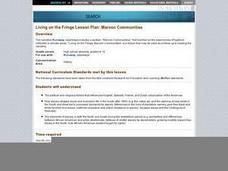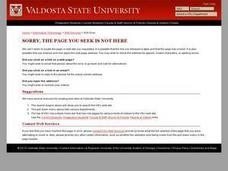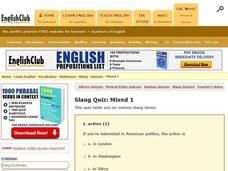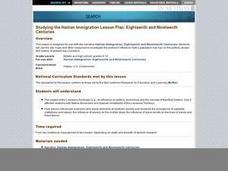Curated OER
Slavery, Manumission, and Freedom: Free Blacks in Charleston before the Civil War
Learners explore the concept of slavery and manumission through a variety of activities. In this civil rights lesson, students gather information from primary sources, then analyze the politics and historical context of the time....
Curated OER
Age of Jackson
Students work on political campaigns. In this campaign history instructional activity, students study the American presidential elections of 1824 and 1828. Students research primary and secondary sources to learn about the campaigns....
Curated OER
Promoting Diversity in Elementary School Curricula
Learners discover the roles played by various racial, ethnic and religious groups in the development of American society. They explore the concept of racial and cultural diversity and global community, as these are joined by economic,...
Curated OER
Terror Tantrum?
Students explore elements that help shape political and economic relationships between different countries and examine the effects of a recent terrorist attack in Saudi Arabia.
Curated OER
Rebellions
Tenth graders explore the causes and effects of the rebellions of Upper and Lower Canada and whether rebellion is an effective means of political change. They research and analyze the impact of the 1837-38 rebellions using primary and...
Curated OER
The 1860 Election in Pennsylvania
Young scholars examine the political parties of the 1860 election and compare their platforms. In this election lesson young scholars determine the meaning of a political cartoon and predict the outcome of the 1860 election.
Curated OER
Women’s Suffrage
Students examine several aspects of the Women's Suffrage Movement. In this women's rights lesson, students explore several primary and secondary sources regarding the events of the movement, opposition to the movement, and the effects of...
Curated OER
The Great Depression: A Study Guide Through Song
Students take a closer look at the political and social outlook during the Great Depression. In this Great Depression lesson plan, students analyze selected songs from the time period. Students use the provided lyric sheets and song...
Curated OER
Maroon Communities
Students examine political and religious factors that influenced English, Spanish, French, and Dutch colonization of the Americas, how slavery shaped social and economic life in the South after 1800, and elements of slavery during the...
Curated OER
Noam Chomsky
In this famous people worksheet, students read a selection about Noam Chomsky and complete a variety of comprehension activities including but not limited to a synonym match, spelling, writing and sequencing activities.
Curated OER
Forceful Persuasion
Students investigate U.S. foreign policy in Middle Eastern countries, and rank their level of support for American military and diplomatic actions.
Curated OER
Ponce de Leon
Fifth graders explain that the discoveries of Ponce de Leon were important, both in and of themselves and to the destinies of Europeans and Native Americans. They write an essay highlighting two of his important discoveries.
Curated OER
Navajo Code Talkers of WWII
Eighth graders assess different ways that significant individuals and events influenced economic, social and political systems in the United States after 1880. They experience a Navajo code talker's dictionary to create and decode messages.
Curated OER
Slang Quiz: Mixed 1
In this slang instructional activity, students select the meaning of the slang word used in each example sentence. There are 10 exercises.
Curated OER
Coalition or Division?
Students research and write essays on contemporary Italian politics and their roots to explain the prime minister's recent resignation in context. They explain why coalition governments are formed.
Curated OER
Studying the Haitian Immigration: 18th and 19th centuries
Students read a narrative and conduct extensive research to determine how Haiti's population has had an influence on the social, political, and economic culture of present-day Louisiana. As a culminating activity, students write papers...
Curated OER
What Was the Cold War About?
Young scholars explore a website to gather some first impressions of the Cold War era and its impact on Canadian society and politics. They, in groups, answer questions about the Cold War on a worksheet imbedded in this plan.
Curated OER
Moot Court
Learners research and discuss court cases in preparation for Moot Court. Student attorneys research precedents involving their cases, while student justices research political ideology of Supreme Court Justices. Student attorneys then...
Curated OER
Geography for Life: Using Five Skills
Students use the five skills of geography to reflect on a favorite learning activity. They consider if the activity had all five skills and if it didn't what could have been done to include those that weren't in it. The five skills are...
Curated OER
Strengthening Democracy In Latin America
Students consider how to strengthen democratic principles in Latin America. In this government systems lesson, students explore the challenges to democratic forms of government in Latin America as they examine primary sources. Students...
Curated OER
Identity
Students analyze identify in art. In this art analysis lesson, students discuss what identify means and discuss how Otto Dix, Pablo Picasso, Dorothea Lange, and Alberto Giacometti represent identities in portraiture. Students complete...
Curated OER
Connecticut Communists
Eleventh graders investigate Cold War politics. In this Connecticut history lesson, 11th graders discover details about the Connecticut Seven who were indicted for violating the Alien Registration Act of 1940. Students write closing...
Curated OER
Knowledge is Power
Students explore the distinct forms of knowledge that enslaved Africans brought with them to America or developed while enslaved. They study how political movements of the 18th century helped develop abolitionist thinking.
Curated OER
Creating Laws
Students view Schoolhouse Rock, I'm Just a Bill video. They explain how a bill becomes a law as well as define the difference between a bill and a law. They discuss how political beliefs might effect the process of a bill becoming a law.

























